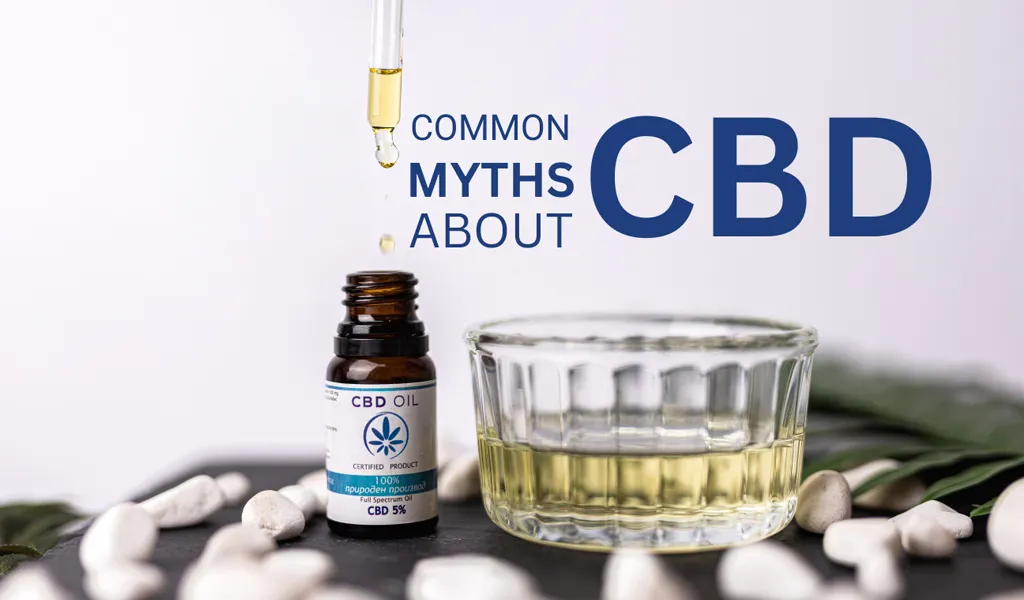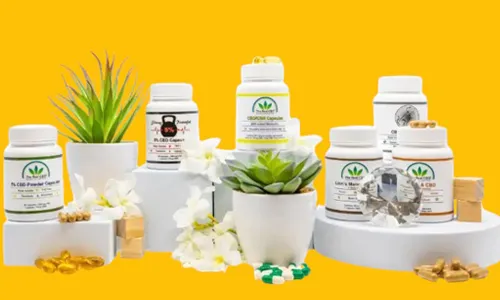As cannabidiol (CBD) continues to rise in popularity as a natural wellness supplement, misinformation and myths have emerged, leaving many people unsure about its true benefits, safety, and legality. While scientific research has increasingly validated many of CBD’s potential uses, misconceptions can prevent people from making informed decisions about its role in their health and well-being.
In this blog, we will address and debunk some of the most common myths surrounding CBD. Whether you’re a first-time user or already familiar with CBD products, this guide will clarify misconceptions and help you understand the real facts about CBD.
Myth 1: CBD Gets You “High”
One of the most widespread myths about CBD is that it produces a psychoactive “high” similar to THC, the active compound in marijuana. Many people associate all cannabis products with psychoactive effects, but this is not true for CBD.
The Reality
CBD is a non-psychoactive compound found in the hemp plant, which means it does not produce the mind-altering effects associated with THC (tetrahydrocannabinol). THC is responsible for the “high” sensation that people experience when using marijuana, but CBD interacts with different receptors in the body and does not induce the same response.
CBD works with the body’s endocannabinoid system (ECS), which plays a role in regulating various physiological processes, including mood, sleep, pain, and immune function. However, unlike THC, CBD does not bind to the CB1 receptors in the brain, which is why it does not cause euphoria or intoxication.
This myth is particularly important to debunk because many individuals avoid CBD for fear of feeling impaired or altered, but in reality, CBD is widely used to promote relaxation and wellness without the “high” associated with cannabis.
Myth 2: CBD Is Illegal
Another persistent misconception is that CBD is illegal because it comes from cannabis, a plant that is federally regulated in many countries. The legal status of CBD can be confusing, especially since cannabis laws vary from one region to another.
The Reality
CBD’s legal status depends largely on the source of the CBD and the jurisdiction in which you live. In the United States, for example, the 2018 Farm Bill legalized the cultivation of industrial hemp (a variety of the cannabis plant) and the production of hemp-derived CBD products, as long as they contain less than 0.3% THC.
In many countries and U.S. states, hemp-derived CBD is legal for purchase and consumption, provided it meets regulatory standards for THC content. However, marijuana-derived CBD, which comes from cannabis plants containing higher levels of THC, remains subject to different legal restrictions.
It is important to note that while hemp-derived CBD is widely legal, the rules surrounding its sale and marketing can still vary, so it’s essential to check the regulations in your specific region before purchasing or using CBD products.
Myth 3: All CBD Products Are the Same
Many consumers believe that all CBD products are identical in terms of quality, efficacy, and safety. This myth can lead people to purchase low-quality or ineffective CBD products, expecting them to deliver the same results as higher-quality options.
The Reality
Not all CBD products are created equal. The quality of CBD products can vary greatly depending on factors such as the source of the hemp, the extraction method used, and the purity of the final product. Here are some key factors that affect the quality of CBD products:
- Source of Hemp: CBD can be extracted from hemp or marijuana plants, but hemp-derived CBD is preferred because hemp is naturally low in THC. The quality of the hemp itself matters, as plants grown in nutrient-rich, organic soil are likely to produce better-quality CBD.
- Extraction Method: The method used to extract CBD from the plant material can impact the purity and potency of the product. CO2 extraction is considered the gold standard because it is clean and efficient, while cheaper methods using solvents like ethanol or butane may leave behind residues.
- Third-Party Testing: Reputable CBD brands provide third-party lab testing results, verifying the product’s potency, purity, and safety. This transparency ensures that consumers are getting what they pay for and that the product is free from harmful contaminants like pesticides, heavy metals, and residual solvents.
To ensure you’re getting a high-quality CBD product, look for brands that use organic hemp, employ safe extraction methods, and offer lab-tested products with clear labeling of ingredients and cannabinoid content.
Myth 4: CBD Works Instantly
Some people expect CBD to work like a magic potion, providing immediate relief or noticeable effects right after consumption. This unrealistic expectation can lead to disappointment and misunderstandings about how CBD functions in the body.
The Reality
CBD does not provide instant effects for most users, and its impact can vary depending on the delivery method, dosage, and individual factors such as metabolism, body weight, and the condition being treated.
- Delivery Method: CBD can be consumed in various forms, including oils, capsules, edibles, and topical creams. Each method has a different absorption rate, which influences how quickly the effects are felt. For example, inhaled CBD (vaping) may provide faster effects than ingested CBD (edibles or capsules), which must pass through the digestive system first.
- Dosage: The appropriate dosage of CBD varies from person to person. Some individuals may require larger doses over time to experience the desired effects. It may take several days or even weeks of consistent use before the full benefits of CBD are realized.
- Chronic vs. Acute Conditions: CBD is often used to address chronic issues like pain, anxiety, or sleep disorders, which may require a cumulative effect. Unlike fast-acting pharmaceuticals, CBD’s benefits can be subtle and gradual, building up over time.
It’s important to manage expectations and understand that while some people may feel immediate relief from CBD, most will experience its effects gradually as it supports the body’s endocannabinoid system.
Myth 5: CBD Is Addictive
There is a common concern that using CBD might lead to addiction or dependency, especially because of its association with cannabis and the potential for drug abuse.
The Reality
CBD is not addictive, and research has shown that it does not produce dependence or withdrawal symptoms, even with long-term use. Unlike THC, which can cause psychological dependence in some users, CBD does not activate the brain’s reward system or create euphoric effects that are linked to addiction.
In fact, some studies suggest that CBD may help reduce addictive behaviors. For example, research is being conducted to explore CBD’s potential role in managing addiction to substances like opioids, nicotine, and alcohol. CBD’s ability to interact with the endocannabinoid system could help modulate brain function and reduce cravings or withdrawal symptoms associated with addiction.
CBD’s non-addictive nature makes it a safe option for those seeking relief from various conditions without the risk of dependence or abuse.
Myth 6: CBD Has No Side Effects
While CBD is generally well-tolerated and considered safe, some people believe that it has no potential side effects whatsoever, leading them to use it without caution or medical advice.
The Reality
While CBD is not known to cause severe side effects, it can still produce mild effects in some individuals, especially when taken in high doses. Common side effects of CBD may include:
- Drowsiness: Some people experience increased drowsiness or fatigue, especially when taking higher doses or using CBD products designed for sleep.
- Dry Mouth: CBD can cause a temporary dry mouth sensation, which can be alleviated by drinking water.
- Gastrointestinal Issues: In rare cases, people may experience nausea, diarrhea, or upset stomach, particularly when consuming edible forms of CBD.
- Interaction with Medications: CBD can interact with certain medications, particularly those metabolized by the liver’s cytochrome P450 enzymes. This interaction may alter how medications are processed, leading to potential side effects or changes in drug efficacy. It’s important to consult a healthcare provider before using CBD if you are taking any prescription medications.
Overall, while CBD is considered safe for most people, it’s important to start with a low dose and monitor for any adverse reactions, especially if you are new to CBD or have underlying health conditions.
Myth 7: More CBD Is Always Better
A common assumption is that higher doses of CBD will result in better or faster results. Some individuals believe that taking large amounts of CBD will enhance its effectiveness for conditions like pain or anxiety.
The Reality
More CBD is not necessarily better. The effects of CBD follow what is known as a “biphasic” response, meaning that both low and high doses can produce different effects. For example, a low dose of CBD may promote alertness and focus, while a higher dose may induce relaxation or drowsiness.
Additionally, there is a threshold where increasing the dosage may not improve benefits and could even lead to diminishing returns or unwanted side effects. This is why finding the optimal dose for your specific needs is crucial, rather than assuming that a higher amount will be more effective.
Most experts recommend starting with a low dose of CBD and gradually increasing it until you find the right balance for your individual needs. Each person’s response to CBD is unique, so a personalized approach is key to maximizing its benefits.
Myth 8: CBD Cures Everything
As CBD’s popularity has grown, so too have claims about its ability to cure a wide range of ailments, from cancer to mental health disorders. This has led to unrealistic expectations and confusion about what CBD can truly do.
The Reality
While CBD has shown potential in helping manage symptoms of various conditions, including chronic pain, anxiety, epilepsy, and inflammation, it is not a cure-all. Scientific research on CBD is still evolving, and while there is evidence to support its therapeutic benefits, more studies are needed to fully understand its long-term effects and efficacy for different health issues.
CBD should be viewed as a complementary tool for wellness, not a miracle cure. It may help alleviate symptoms and improve quality of life for some individuals, but it is not a substitute for professional medical treatment or prescription medications.
Consumers should be cautious of companies that make exaggerated claims about CBD’s abilities to cure serious illnesses. Always consult with a healthcare professional before using CBD for medical purposes, especially if you have an underlying health condition.
Conclusion
CBD has a lot to offer as a natural wellness supplement, but it’s important to separate fact from fiction. By debunking these common myths, you can make more informed decisions about incorporating CBD into your lifestyle. Remember, quality, dosage, and realistic expectations are key to experiencing the potential benefits of CBD safely and effectively.


